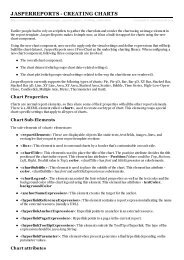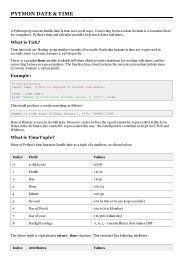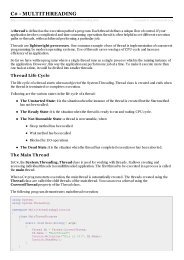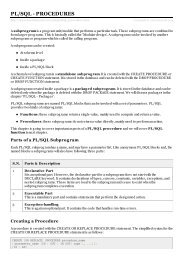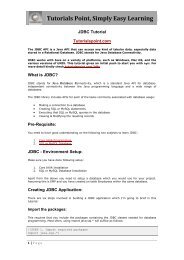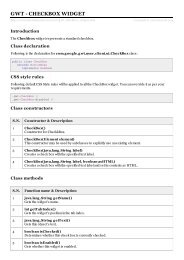Download Scala Tutorial (PDF Version) - Tutorials Point
Download Scala Tutorial (PDF Version) - Tutorials Point
Download Scala Tutorial (PDF Version) - Tutorials Point
You also want an ePaper? Increase the reach of your titles
YUMPU automatically turns print PDFs into web optimized ePapers that Google loves.
Partially Applied Functions<br />
Currying Functions<br />
Functions Call-by-Name<br />
Typically, parameters to functions are by-value parameters; that is, the value of the parameter is determined before<br />
it is passed to the function. But what if we need to write a function that accepts as a parameter an expression that<br />
we don't want evaluated until it's called within our function? For this circumstance, <strong>Scala</strong> offers call-byname<br />
parameters.<br />
A call-by-name mechanism passes a code block to the callee and each time the callee accesses the parameter, the<br />
code block is executed and the value is calculated.<br />
object Test {<br />
def main(args: Array[String]) {<br />
delayed(time());<br />
}<br />
}<br />
def time() = {<br />
println("Getting time in nano seconds")<br />
System.nanoTime<br />
}<br />
def delayed( t: => Long ) = {<br />
println("In delayed method")<br />
println("Param: " + t)<br />
t<br />
}<br />
Here, we declared the delayed method, which takes a call-by-name parameter by putting the => symbol between<br />
the variable name and the type. When the above code is compiled and executed, it produces the following result:<br />
C:/>scalac Test.scala<br />
C:/>scala Test<br />
In delayed method<br />
Getting time in nano seconds<br />
Param: 81303808765843<br />
Getting time in nano seconds<br />
C:/><br />
Here, delayed prints a message demonstrating that the method has been entered. Next, delayed prints a message<br />
with its value. Finally, delayed returns t.<br />
Functions with Named Arguments<br />
In a normal function call, the arguments in the call are matched one by one in the order of the parameters of the<br />
called function. Named arguments allow you to pass arguments to a function in a different order. The syntax is<br />
simply that each argument is preceded by a parameter name and an equals sign. Following is a simple example to<br />
show the concept:<br />
object Test {<br />
def main(args: Array[String]) {<br />
printInt(b=5, a=7);<br />
}<br />
def printInt( a:Int, b:Int ) = {<br />
println("Value of a : " + a );<br />
println("Value of b : " + b );<br />
}<br />
}<br />
TUTORIALS POINT<br />
Simply Easy Learning



